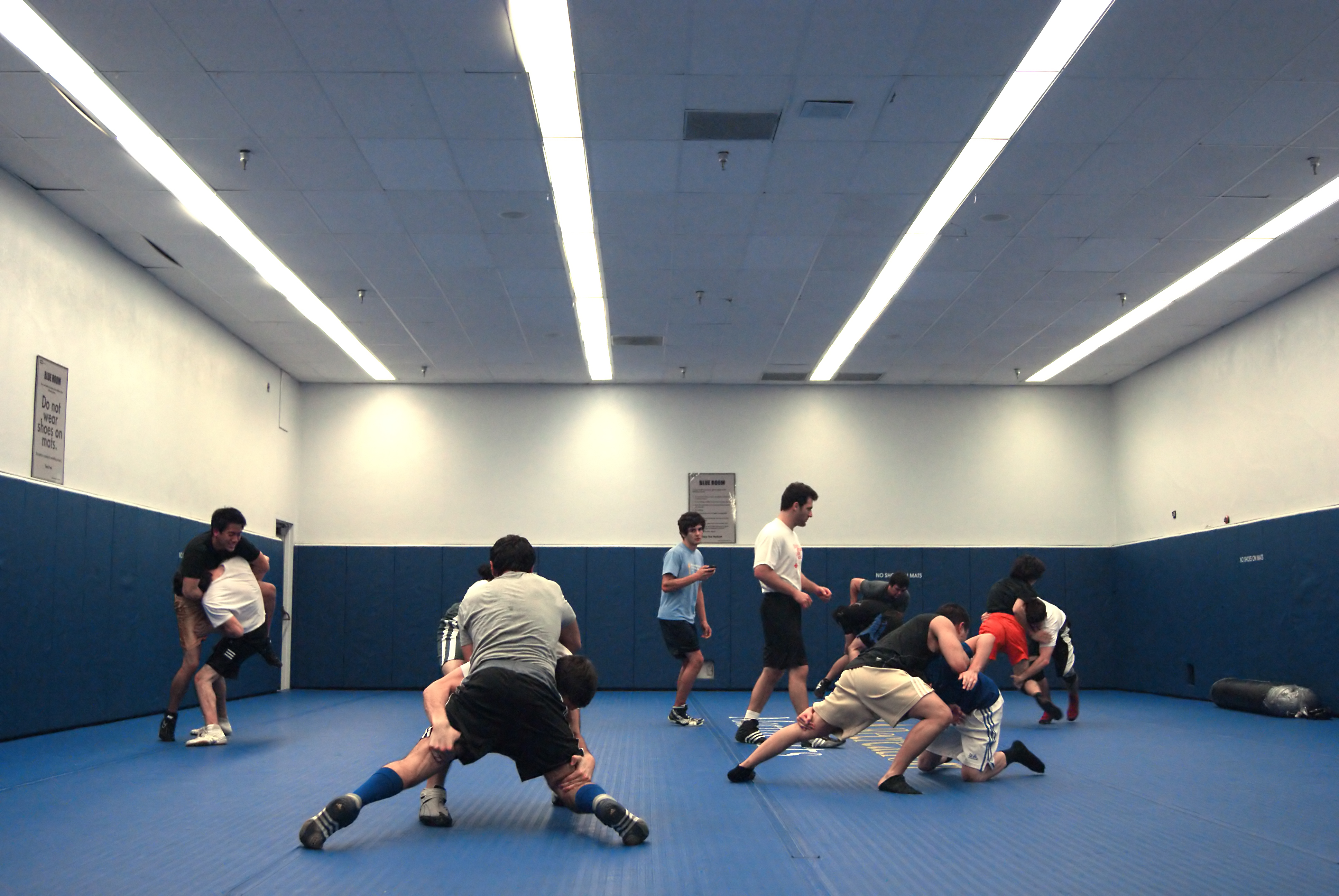
Members of UCLA Wrestling work on their conditioning by doing push-ups. The club had fewer than 10 members when it started but has since grown.
On command, a barrage of thuds rhythmically strikes the mat. Forearms drive faces into the blue floor, while knees and elbows connect with lower backs and heads. Tangled bodies shoot back up, just to collapse again into tangled messes of flesh. These battles for supremacy only end with a takedown, when a wrestler achieves complete control over an opponent on the ground.
At the end of each round, club members stand on sweaty footing, steadily panting at unison. The action lasts all of a minute, yet the wrestlers’ red faces and limbs illustrate an impassioned level of exertion.
This exercise, known as the Iron Man drill, may just be a fixture during biweekly, two-hour practices in the John Wooden Center’s Blue Room. But for James Tsuffis, mastering the opposition on the mat, while sometimes measured in seconds, begets mastering aspects of everyday life.
“Wrestling turned my life around. It taught me the essence of hard work and what it really meant to sacrifice,” said Tsuffis, a fourth-year economics student and wrestling club president.
The UCLA Wrestling club intends on sharing the value of the world’s oldest sport with a wider audience by distilling high school wrestling’s best aspects into a casual, commitment-free club. Members feel that a special camaraderie and profound self-discovery reside under wrestling’s superficially animalistic surface.
“I want (people) to see how fun wrestling is, and to get the itch that a lot of our members have,” club treasurer Matt Silva-Thwaites said. “It’s a martial art. It’s beautiful.”
The club was born last fall when Tsuffis met Silva-Thwaites, a fourth-year history student, in Bruin Cafe. After a wrestling emblem on Tsuffis’ backpack caught Silva-Thwaites’ eye, the two conversed and agreed that UCLA, lacking a wrestling team, was missing something special. They decided to start a program on the spot.
Tsuffis believes that the club provides newcomers a unique experience that fosters an intense camaraderie among both teammates and competitors.
“Every wrestler you meet is a real one; it’s in their blood. They participate in a sacrifice, even though they know that (as a career) it’s not going anywhere. They engage in the sport because they love it.”
UCLA Wrestling proposes that real wrestlers come in all kinds of packages and that a love for the sport can enter the bloodstream: Anyone who pays the club’s lone fee, $20 for shoes, can join.
First-year bioengineering student Sophia Hu recognizes the effective sense of community promoted by the club.
“I’ve been wrestling for five weeks, and I’m super bad at it. I never thought I’d wrestle,” Hu said. “(The other wrestlers) never make me feel like I’m doing a bad job, even though I am. I like that because it makes me feel comfortable.”
Because of how its competitions divide athletes into strict weight classes, wrestling favors discipline and perfection of individual skill over physical prowess.
Silva-Thwaites grew to love wrestling as a youth because other sports overly emphasized natural qualities like body type and hand-eye coordination.
“(In wrestling), it’s what’s inside that counts,” Silva-Thwaites said.
The devotion that goes into each match allows combatants to develop a mutual respect for each other, despite the sometimes violent path to victory.
“I have more respect for people who aren’t good, because to come out and put everything on the line, it takes a lot of character,” Silva-Thwaites said.
Wrestlers also believe that the individual nature of competition eliminates excuses for poor performances, allowing the sport’s participants to work on accountability.
“When I lose, I get mad at myself. I think about how I’m supposed to work harder in areas I need to improve,” fourth-year history student Steve Sohanaki said.
“Win or lose, it’s all on you.”
Sohanaki, the club’s instructor, leads practice by modeling modes of attack and responses to specific scenarios for other members. He feels that wrestling builds friendship because it forces athletes to separate personal matters from battles on the mat, eliminating notions of pride.
Though the club welcomes newcomers seeking a fighting foundation or a great workout, most members are longtime wrestlers who cannot stay away. Being part of the club reflects their appreciation for a sport to which they owe much of their lives.
“It’s a dying sport, so it’s hard to give up. It’s given me so much, and I want to give that back to other people,” said fourth-year political science student Julian Ramirez, the club’s vice president.
Third-year neuroscience student Brian Licht is grateful for the way wrestling freed him from self-doubt in his capacity to succeed. Licht said he loves wrestling because while the sport revolves around conquering a physical opponent, it ultimately cultivates the taming of one’s self, anxiety and all.
“Some people are scared that if they put everything into something, it might not meet their expectations. If you get rid of that fear, you get rid of fear for a lot of other things. It’s worth it to try and measure yourself in every way you can.”
